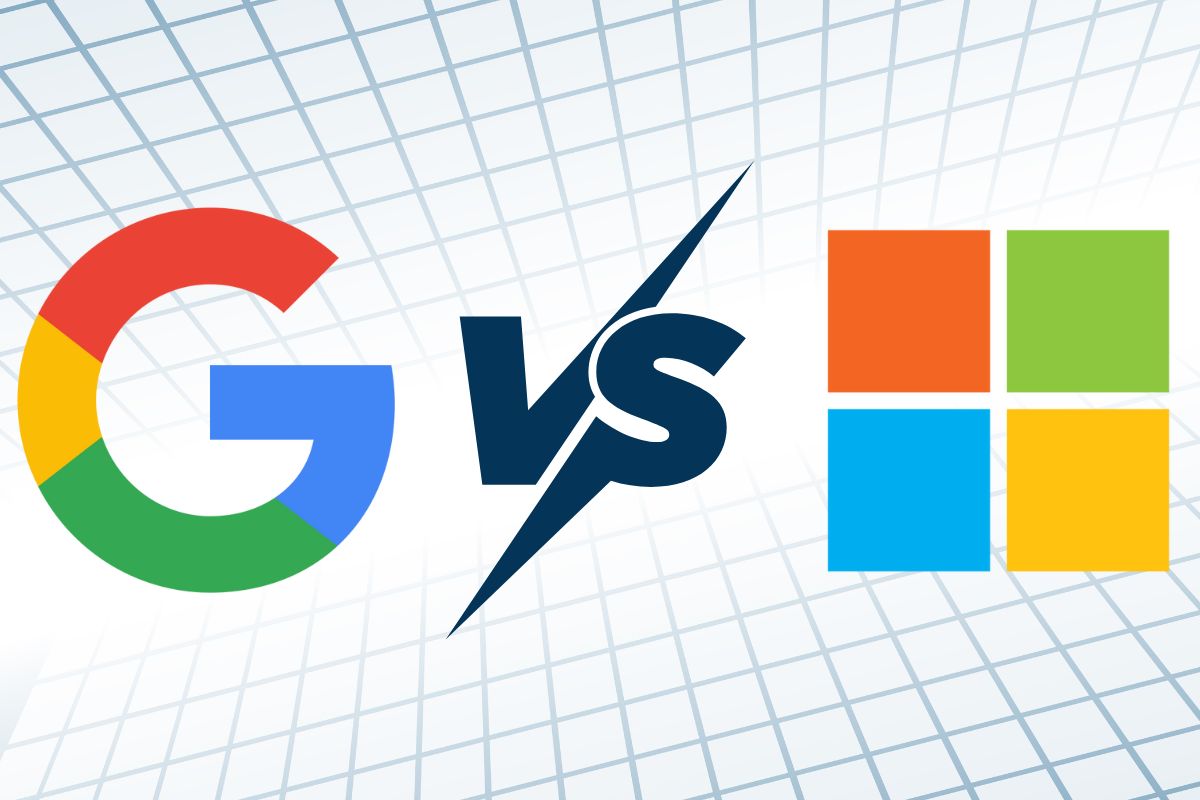Google and Microsoft are two of the largest and most powerful tech firms in the world. They have played a significant role in contributing to the digital economy through new products, comprehensive services, and strong business models.
This article presents a complete comparison between Google vs Microsoft, these technology giants considering their history, product ranges, market positions, financing, innovations, customer satisfaction levels, and future prospects
Company Histories
Larry Page and Sergey Brin, who were Ph.D. students at Stanford University, came up with Google in 1998.
Not long after becoming a search engine, Google diversified its products by launching other digital offerings like advertising, cloud computing as well as consumer electronics.
Google adopted a structure of a holding company in 2015 with Alphabet Inc. as its parent company in order to demarcate core internet services from other activities like health tech and autonomous vehicles.
Microsoft
Bill Allen and Paul Gates founded Microsoft in 1975. The company developed the Windows operating system that transformed personal computers.
It has expanded over the years into software development and hardware production, including games and cloud computing.
It is known for professional software’s presence on the business market, having been continuously updating itself to match digital age expectations.
Core Products and Services
| Category | Microsoft | |
|---|---|---|
| Search & Ads | Google Search, Google Ads, AdSense | Bing, Microsoft Advertising |
| Productivity | Google Workspace (Docs, Sheets, Gmail) | Microsoft 365 (Word, Excel, Outlook) |
| Cloud Computing | Google Cloud Platform (GCP) | Microsoft Azure |
| Operating Systems | Android, Chrome OS | Windows, Windows Server |
| Browsers | Google Chrome | Microsoft Edge |
| AI & Assistants | Gemini (formerly Bard), Google Assistant | Copilot, Cortana (retired) |
| Devices | Pixel phones, Nest, Chromebooks | Surface laptops, Xbox, HoloLens |
| Developer Tools | Firebase, TensorFlow | Visual Studio, GitHub, .NET |
Google vs Microsoft: Market Position and Financial Performance
Google’s largest revenue contributor is its advertising business, underpinned by a secure position of its search engine. The other emerging source of income is Google Cloud, fueled by the increasing use of cloud-based services in all sectors.
Most of this revenue was contributed by advertising, which amounted to $348.16 billion during 2024.
For more in-depth statistics, you can look at Statista‘s report on the annual revenues of Google between 2002 and 2024.
Microsoft
With a diversified product lineup, Microsoft has consistently continued to grow its revenues. Its cloud, Azure, and Microsoft 365 are some of the significant revenue sources.
In 2024, Microsoft reported revenue exceeding $245.1 billion, with substantial contributions from its cloud and software divisions.
The strategic acquisitions of the company, i.e., LinkedIn and GitHub, have also improved its market position.
Google vs. Microsoft: Innovation and Development
The company has been known for its culture of innovation based on heavy investments into research & development, including projects like Waymo (driverless cars), Google AI as well as quantum computing initiatives somewhere at the top edges.
Machine learning and artificial intelligence continue to fuel innovation in the products and services offered by Google itself which have now become indispensable aspects of these technologies.
Microsoft
Microsoft incorporates AI in its product portfolio, investing heavily in AI research, cloud computing, and mixed reality (HoloLens).
The company’s acquisition of LinkedIn and GitHub indicates its focus on growing its ecosystems and deepening its expertise in professional networking and software development.
Google vs Microsoft: Customer Satisfaction and Reviews
Google Workspace has a high rating for its simple interface and collaborative tools. Gartner Peer Insights gives Google Workspace a 4.6-star rating based on customer reviews, with reviewers commending its ease of use and integration features.
Google Cloud Platform has also gained praise for its powerful data analytics and AI capabilities.
Microsoft
Microsoft 365 has a solid reputation, especially in enterprise settings. It is rated 4.4 stars by Gartner, and users like its wide range of tools and solid security features.
Microsoft Azure is also well-respected for its enterprise-level solutions and hybrid cloud features.
Google vs Microsoft: Key Differences
Target Market
- Google: Mainly targets consumer products and web-based services, and has strong ads and cloud-based operations.
- Microsoft: Has a stronger emphasis on professional software and enterprise-grade solutions, addressing business requirements with offerings such as Microsoft 365 and Azure.
Cloud Services
- Google Cloud: With its AI and data analytics capabilities, a go-to for organizations looking for sophisticated data and advanced solutions.
- Microsoft Azure: Provides large-scale enterprise-level services and hybrid cloud support, best suited for large business operations.
Product Ecosystem
- Google: The ecosystem is centered on its search engine, advertising, and consumer electronics. Google’s products are user-friendly and elegantly integrated.
- Microsoft: The Ecosystem is centered on Windows, Office, and enterprise solutions, offering a more integrated experience for business users. Microsoft’s products have a reputation for security and business-oriented features.
Conclusion
Both Google and Microsoft are giants in the technology industry, both with unique strengths and strategic emphases.
The innovative flavor of Google is strong in web-based products, while Microsoft has turned out to be an engine in full-featured multi-user operating systems.
Regardless of whether one prefers the effortless integration and cooperative software of Google or the secure business solutions of Microsoft, they both have useful resources that enable innovation and productivity in the online environment.












